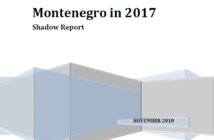Starting from 2018, Balkan Tender Watch – a regional coalition of civil society organizations working on fight against corruption in public procurement – assesses the state-of-affairs in public procurement in the Western Balkans.
Based on the unique monitoring methodology comprised of 68 indicators, the average score for all six WB countries related to public procurement performance in terms of application of legislative, institutional, systemic and practical anticorruption measures is calculated at 67%, which means that 33% of all public procurements are still implemented under serious threat of corruption.
In 2022, the total value of public procurement in all WB countries amounted to total of 11.6 billion EUR. The average share of public procurement in the gross domestic product (GDP) of WB countries stands at 8.78%, while its share in total budget expenditure averages at 25.7%. When this amount is correlated to the calculated score of 67%, it could be inferred that, annually, 3.8 billion EUR are under direct threat of corruption.
As regards the general preparedness of WB countries in the area of public procurement, the European Commission has assessed Montenegro as the best prepared and Bosnia and Herzegovina as the least prepared country. Montenegro has moderate-to-good and Bosnia and Herzegovina has some level of preparedness. Kosovo is assessed as some-to-moderately prepared, with remaining WB countries (Albania, North Macedonia and Serbia) falling within the range of moderate preparedness. All WB countries are recommended to improve integrity, fight against corruption and conflict of interests in public procurement, and to ensure consistent implementation of public procurement rules.
Public procurement in the Western Balkans is characterized by absence of/insufficient competition, incomplete transparency, lack of efficient control across the entire public procurement cycle, especially in respect to contract performance, and lack of integrity.
Almost all WB countries suffer some form of non-alignment of their respective legislative and institutional frameworks, which creates problems in implementation of public procurements.
Impunity for violations, abuses and criminal offences committed as part of tender procedures remains the biggest problem in the fight against corruption in public procurement and hinders all and any efforts made towards more efficient public spending.
WB countries are recommended to further improve transparency, accountability and liability in public procurement, take specific measures aimed at detecting and preventing conflict of interests, promote integrity in public procurement, as well as process and monitor cases of malpractice and abuse.
WB countries should take urgent and enhanced efforts to ensure and promote competition, equal treatment and non-discrimination in public procurement, as well as to provide further professional and continuous training for persons involved in public procurement.
In addition to the Comparative Evaluation Report, for state-of-affairs in the field of public procurement at the level of individual WB countries is covered under annual shadow reports aimed to offer country- and evidence-based insight into and “local” view of public procurements: how effective is the public procurement system; is the legislative and institutional setup appropriate; and do the practical measures taken safeguard against corruption.
Complete report download HERE (PDF)

